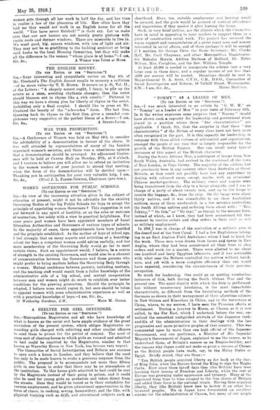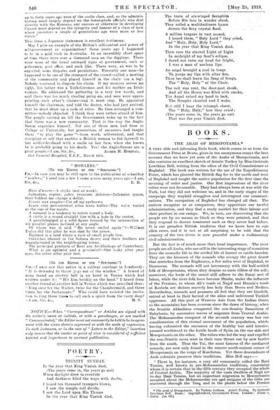" TOMMY " AS A LEADER OF MEN. (To THE
EDITOR OF THE " SPECTATOR.") STS,—I was much interested in an article by " 0. W. M." on " ' Tommy' as a Leader of Men " in your issue of February 16th. In it the writer expresses some surprise that " Tommy " should have shown such w capacity for leadership and government when placed in a position where these "fine characteristics" are applicable. I think, Sir, that the surprise is that' these "fine characteristics" of the Briton of every class have not been more often recognized in the past. It is this capacity for leadership, in company with those allied virtues of self-control and organization, amongst the people of our race that is largely responsible for the grocith of the British Empire. One cau recall many typical instances of this aspect of the British character.
During the South African War, a contingent of troops from New South Wales, Australia, had arrived in the roadstead off the town of East London, in Cape Colony. The majority of the soldiers had not previously been in any country other than Australia or Great Britain, so -they could not possibly have had any experience in dealing with coloured races, except, maybe, with an occasional Chinese market-gardener. The military stores and wagons were being transferred from the ship to a barge alongside, and I was in charge of a party of about twenty men, sent on to the barge t•)' receive the baggage, &o., from the ship. On the barge were about thirty natives, and it was remarkable to see these Australian soldiers, many of them uneducated, in a few minutes controlling the South African natives and ordering them about with : "'Ere, Johnny," " Do this," or "Do that," as though to the manner born. instead of which, as I knew, they had been accustomed -till that moment to receive orders and obey orders in their civil as well as military employment.
In 1916 I was iu charge of the sanitation of a military area in the desert east of the Suez Canal. I had a few Englishmen belong- ing to an East Anglian Field Ambulance whom I had to train for the work. These men were drawn from farms and towns in East Anglia, where they had been accustomed all their lives to obey orders and work for a master. There were allotted to me about one hundred and forty Egyptian labourers, and it was uoticeablo with what ease the Britons controlled the natives without harsh- ness, and yet with a more complete efficiency thin one would have expeoted, considering the circumstances of their previous occupation.
So much for leadership. One could go on quoting numberless instances of this, both during the South African War and the present one. The quiet dignity with which the duty is performed, but without unnecessary harshness, is the meet remarkable characteristic, so different from the brutalizing methods of the Germans as shown in their management of their aforetime, colonies in. New Guinea and Kiao-chau in China, and in the waterways of China, where, to my sorrow, I have seen the Prussian efforts at settle neat. During a journey in Korea, or Chosen as it is now called, in the Fax East, which I undertook before the war, one noticed the somewhat undignified attitude of the Japanese rank- and-file of the administration in their dealing. with the less progressive and more primitive peoples of that country. This was commented upon by more than one high official of the Japanese Government, and one gentleman, a Minister of His Imperial Majesty's Government of Japan, explained to me the causes, as he understood them, of Britain's success as an Empire-builder, and the reasons why Japan could not make as great a success of Chosen as the British people have made, say, in the Malay States or Egypt. Briefly stated, they are these :-
" You British people acquired liberty as far back as the days of King John, when the Barons forced the King to sign the Magna Carta. Ever since those far-off days they (the British) have been learning their lessons of Freedom and Liberty, while the rest of Europe was groaning under oppression and tyranny. Many of-the oppressed from time to time escaped to the free shores of Britain and added their force to the national strain. Having thus acquired liberty, they_ (the British) know how to bestow it on other less favoured peoples. We in Japan have formulated an excellent scheme for the -administretion of. Chosen, but many of our people
ap to forty years ago were of the coolie class,. end, as the adminis- tration must largely depend on, the lower-grade officials who deal directly with the Koreans, our success or otherwise in developing Chosen must depend on the integrity and honour of a class of men whose ancestors a couple of generations ago were more or less slaves."
This from a Japanese statesman is excellent testimony.
May I give an example of .the Briton's self-control and power of self-government or organization? Some years ago I happened to be in a gold rush in Australia. In an incredibly short space of time there were over a thousand men on the diggings. There were none of the usual outward signs of government, such as policemen, post office, and such like. There were, as was to be expected, seine disputes and peculations. Presently one man—he haPpened to be one of the strongest of the crowd—called a meeting of the community and placed himself in the chair (on a log). Nobody ventured to dispute his claim. If my memory serves me right, his father was a Yorkshireman and his mother an Irish- woman. He addressed the gathering in a very few words, and said there was too much stealing going on, and men were appro- priating each other's claims—and it must stop. He appointed himself the chairman, and told the doctor, who had just arrived, that he must draw up a code of rules. He then arranged a com- mittee—nobody objected. I think they were rather afraid of him. The people carried on till the Government woke up to the fact that there was a new community. That is the way the Anglo- Saxon organizes himself. Not one of those men had been to College or University, but generations of ancestors had taught them "to play the game "—team work, self-control, and that discipline of self that enables a British woman to bid farewell to her soldier-husband with a smile on her face, when she knows he is probably going to his death. Yes! the Anglo-Saxons are a



























 Previous page
Previous page